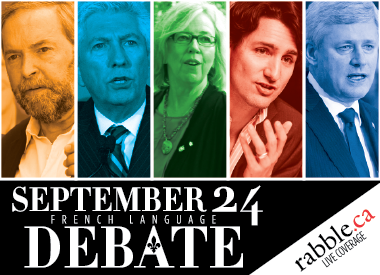Like this article? rabble is reader-supported journalism. Chip in to keep stories like these coming.
The next stop on the federal election campaign trail is Montreal, Quebec for a leaders’ debate in French this Thursday, Sept. 24. Quebec holds a substantial 78 of the overall 338 seats up for grabs in the House of Commons.
Unlike other debates, Thursday night will see Green leader Elizabeth May and Bloc Quebecois leader Gilles Duceppe in the fray alongside the leaders of Canada’s big three parties, the Liberals, NDP and Conservatives. The debate will take place at the Radio-Canada (CBC) Montreal studios.
So what is in store for Quebec, which over the last 20 years has swung from Liberal dominance to Bloc stronghold (asserting Quebec’s presence in Ottawa) and then, going from one seat to 58 in 2011, NDP home-base?
The prevailing wisdom, and polling, is that the NDP will hold most of their seats. An Ekos poll at the end of August pegged NDP support at 42 per cent in Quebec, with the Liberals, Conservative and Bloc hovering just below 20 per cent each.
But nearly a month remains in the campaign, and much can happen.
Thursday’s debate will be the first time many francophones see the leadership candidates in a debate setting duking it out for votes. Recall former NDP leader Jack Layton’s exceptionally strong debate performances — and former Liberal leader Michael Ignatieff’s and Duceppe’s weak ones — immediately preceding the “orange wave” at the ballot box. A second French-language debate is scheduled October 2, and some French will be heard during the Munk Debate, September 28.
Key themes of economy, pipelines and environment, and respect for Quebec’s authority to make its own decisions (ie. sovereignty) will need to be addressed by leaders to court voters there.
Prime Minister Stephen Harper sent a letter last week reiterating his positions on Quebec to Premiere ministre Philippe Couillard, governing leader of the province’s right-wing Liberal Party. Harper assured Couillard he could provide economic stability, stressing that while Couillard embarks on an ambitious austerity agenda, which is being met by a steady though fractured public opposition, including thousands of public school teachers going on strike for one day on September 30, and student associations regrouping. Harper also wrote he would allow the Quebec leader “to establish your priorities throughout the territory of Quebec,” appealing to sovereigntist sentiments. But this was, as always, qualified with the phrase “within a unified Canada.”
The Conservatives control a few ridings in the suburbs around Quebec City. But much of Quebec is firmly anti-Harper, and the Conservatives will be hard pressed to make big gains, though they are pouring significant resources into targeted ridings.
The Liberals, who held most of Quebec through much of Canada’s history, have struggled to gain momentum. Trudeaumania has faded and the current Liberal leader Justin Trudeau has been criticized, for example, for not showing up in Quebec City until 32 days into the campaign. Locally, Trudeau is in a close race for his own riding of Papineau, in jeopardy of losing it to star NDP candidate Anne Lagace-Dowson. And, of less concern but quite vicible, the Liberal’s candidate posters have been ridiculed widely and parodied.
Both Trudeau and NDP leader Tom Mulcair have been interrupted at campaign stops in Quebec for their stances on pipelines, symbols of climate policy. Their seeming support for the proposed Energy East pipeline, which would move 1.1 million barrels of tar sands per day from Alberta to the Atlantic, has raised the ire of Quebecers, who overwhelmingly reject the project, seeing it as a threat to the St Lawerence River and their sovereignty.
The Bloc Quebecois, down to two seats from 49 four years ago, have attacked every major party, and in particular the NDP, for their positions on Energy East. The Bloc trying to distinguish itself from the NDP in opposing the pipeline, a stance Nora Loreto disputed Monday as part of rabble.ca‘s Election Fact Check coverage. The Greens are also against the pipeline, but have had little presence in Quebec.
The Bloc is conjuring up Islamophobic sentiments with their stand attacking on the right of women to wear niqabs during citizenship ceremonies. This, as in English Canada, resonates with an unsettlingly large number of Quebecers.
The position of Duceppe’s nationalist Bloc Quebec on the niqab and on conflicts in the Middle East align closely the Conservatives. Some commentators have wondered whether the two parties, who diverge on economic policy lines, might cooperate in Quebec. But Duceppe said recently he is firmly against the Conservatives, and might form a coalition with any party but the Conservatives.
Adding to the charged dynamics in Quebec, a protest will be happening outside the debate in Montreal on Thursday. It is organized by groups representing social housing concerns, women, pipeline opposition, organized labour and more. While there is a general anti-Harper sentiment among protest organizers, many are sceptical of the other parties as well.
What effect will this all have on Quebec’s notoriously temperamental electorate? And what will happen when the debates, which have been tedious fencing matches thus far, see new participants in the ring and a collective jump across the language divide? It’s anyone’s guess.
David Gray-Donald studied Environment & Biology at McGill University then worked there facilitating community sustainability projects. He is trying to undo our reliance on fossil fuels and educate himself on how to be a responsible white guy. He lives in Montreal and Toronto.
Photo: flickr/ abdallahh




